
My paper w/Maryam Kouchaki, “Virtuous Victims”, is out today in @ScienceAdvances!
We show that people often see victims of wrongdoing as morally virtuous—not because of anything that they have done, but simply because others have mistreated them.
science.org/doi/10.1126/sc…
🧵👇
We show that people often see victims of wrongdoing as morally virtuous—not because of anything that they have done, but simply because others have mistreated them.
science.org/doi/10.1126/sc…
🧵👇
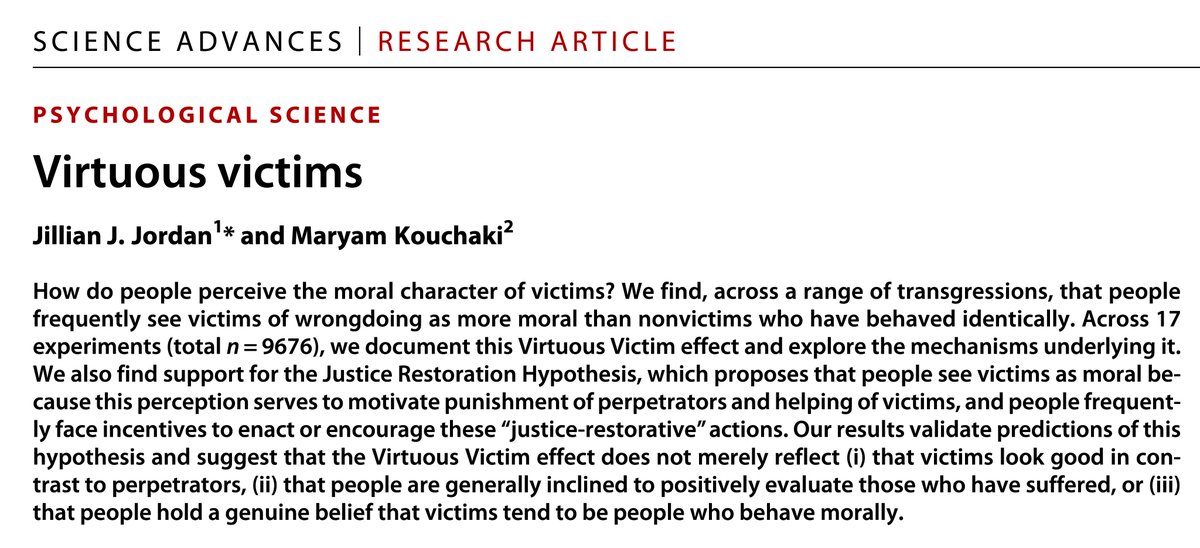
We constantly encounter narratives about immoral acts and their victims. How do these narratives shape our perceptions of victims?
2/n
2/n
Research on “victim blaming” shows that people sometimes blame victims for causing their own victimization (although this is clearly not always our reaction to alleged wrongdoing).
We ask a theoretically distinct q: How do people perceive the *moral character* of victims?
3/n
We ask a theoretically distinct q: How do people perceive the *moral character* of victims?
3/n
It might seem weird to suggest that that one’s status as a victim should have any bearing on their perceived moral character. After all, both good and bad people can be mistreated.
4/n
4/n
Yet across a range of transgressions, we found that American subjects (mostly from Mturk) rated victims as more morally good than non-victims who behaved identically.
Our paper documents and explores this “Virtuous Victim effect” across 17 studies (total n = 9,676).
5/n
Our paper documents and explores this “Virtuous Victim effect” across 17 studies (total n = 9,676).
5/n
Basic method is simple. Subjects read a story about a target character who takes some actions. In the neutral condition, story ends there. In the victim condition, somebody goes on to mistreat the target.
Subjects assigned to victim condition rate target as more virtuous.
6/n
Subjects assigned to victim condition rate target as more virtuous.
6/n
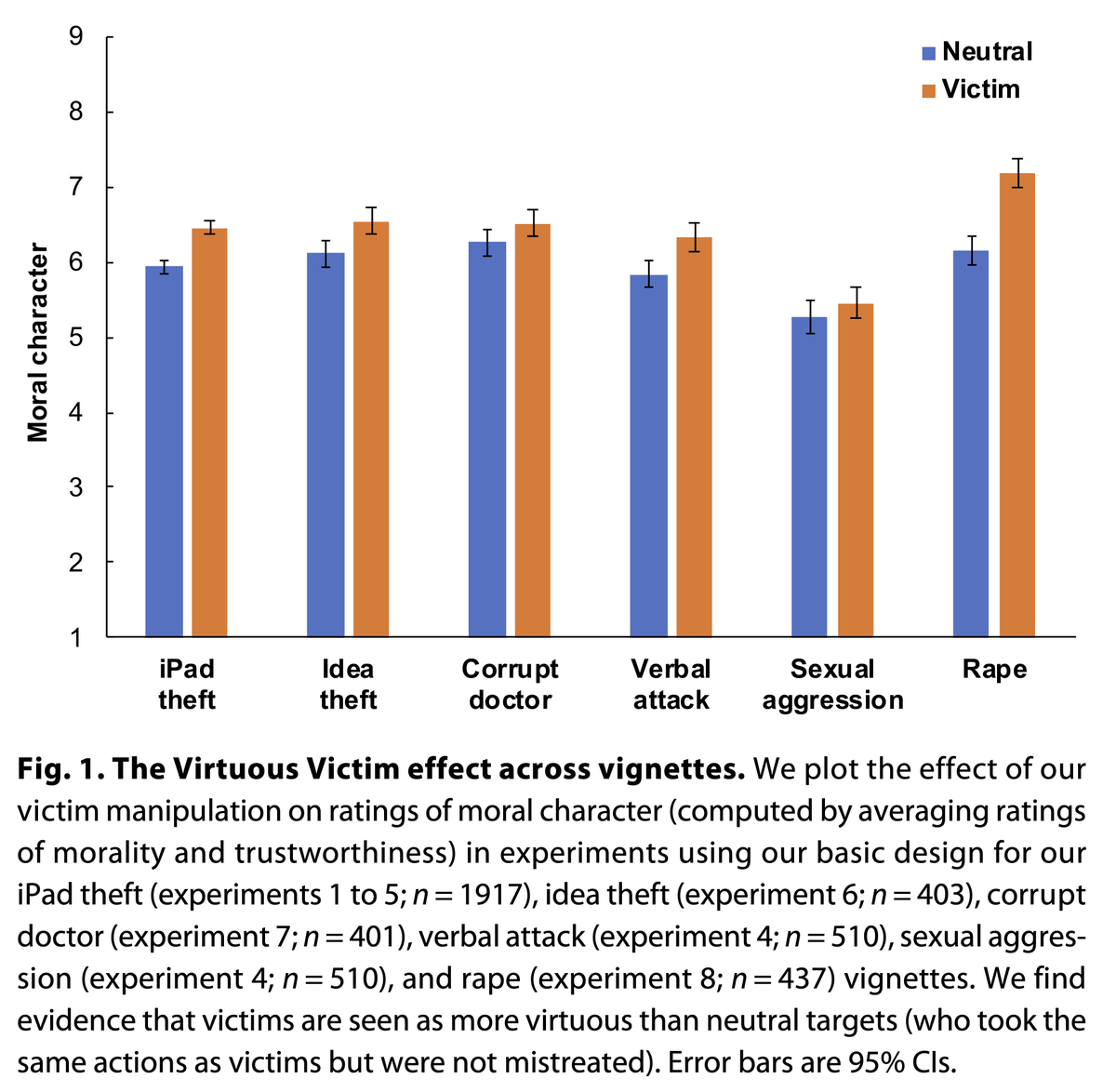
We explore boundary conditions, and find:
-Stronger effect when subjects learn about the perpetrator who wronged the victim
-More reliable effects when victim narrative presented in third-person (vs first-person)
-Effect holds when victim is male or female, & Black or white
7/n
-Stronger effect when subjects learn about the perpetrator who wronged the victim
-More reliable effects when victim narrative presented in third-person (vs first-person)
-Effect holds when victim is male or female, & Black or white
7/n
What causes the effect? We argue that ppl see victims as moral because…
-This perception motivates us to help victims & punish the perpetrators who wronged them
-We often face social incentives for these “justice-restorative” actions (e.g., they can boost our reputations)
8/n
-This perception motivates us to help victims & punish the perpetrators who wronged them
-We often face social incentives for these “justice-restorative” actions (e.g., they can boost our reputations)
8/n
We find evidence for this “Justice Restoration Hypothesis” & against alternatives like:
-Victims just look moral in contrast to perps
-People just rate victims positively bc they feel sorry for them
-People genuinely believe that victims tend to be people who behave morally
9/n
-Victims just look moral in contrast to perps
-People just rate victims positively bc they feel sorry for them
-People genuinely believe that victims tend to be people who behave morally
9/n
To support the Justice Restoration Hypothesis, we first validate its key assumption: if you see a victim as especially virtuous, you'll be more driven to help & punish
When victims are described as more moral, subjects report more motivation for justice-restorative action.
10/n
When victims are described as more moral, subjects report more motivation for justice-restorative action.
10/n
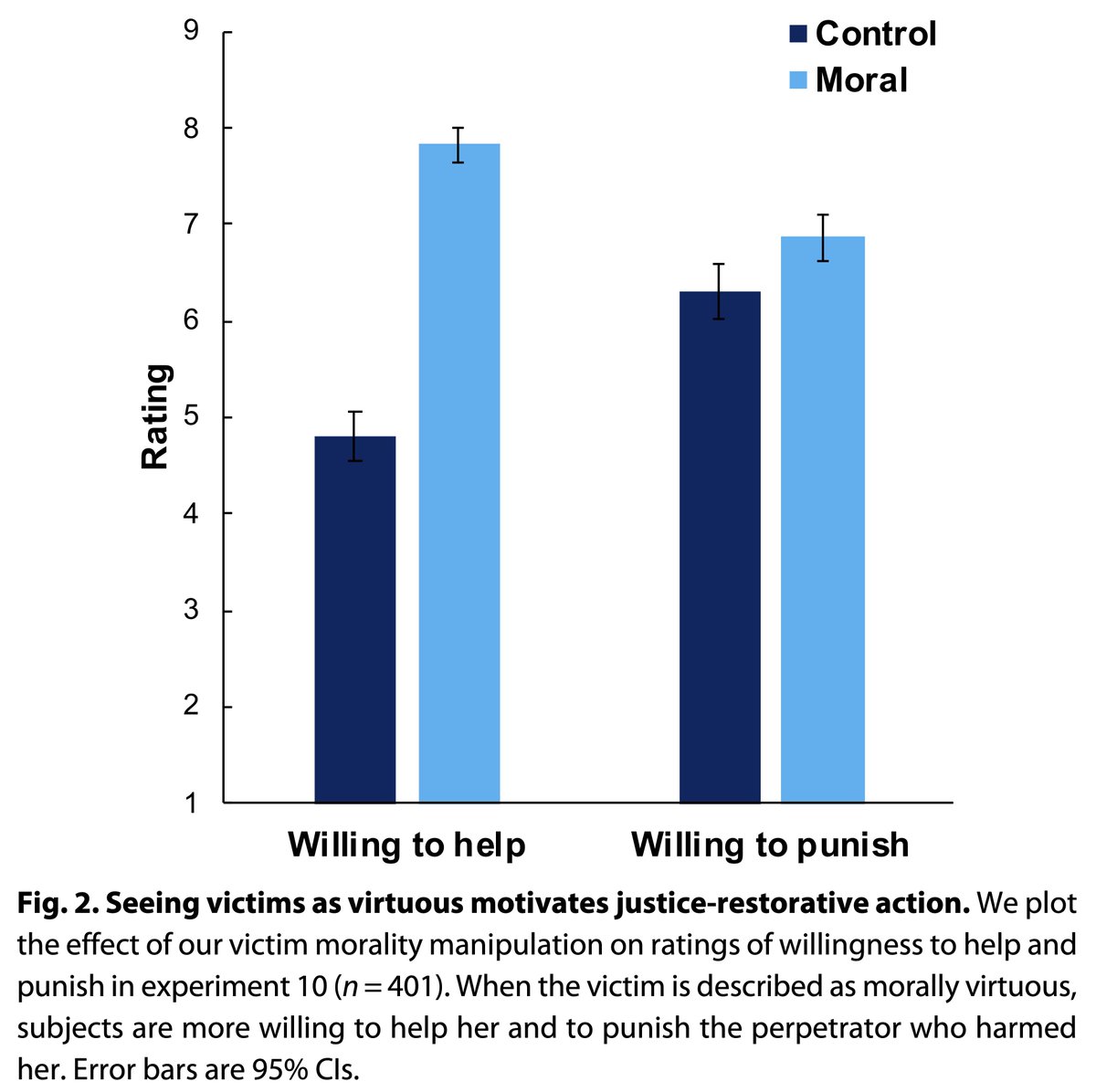
But is this WHY we see victims as virtuous?
If so, then the Virtuous Victim effect should disappear when we introduce *disincentives* for justice-restorative action (such that feeling motivated to help & punish is no longer beneficial)
11/n
If so, then the Virtuous Victim effect should disappear when we introduce *disincentives* for justice-restorative action (such that feeling motivated to help & punish is no longer beneficial)
11/n
We tested this prediction.
We asked subjects to imagine working at an advertising agency where slogans were brainstormed in teams, creating the potential for people to unfairly take credit for each other's ideas
12/n
We asked subjects to imagine working at an advertising agency where slogans were brainstormed in teams, creating the potential for people to unfairly take credit for each other's ideas
12/n
To introduce disincentives, we asked some (but not all) subjects to imagine being motivated to defend the stance that...
-idea theft, while immoral, happens only rarely
-slogans therefore SHOULD be brainstormed in teams
13/n
-idea theft, while immoral, happens only rarely
-slogans therefore SHOULD be brainstormed in teams
13/n
These subjects thus imagined facing disincentives for justice-restorative action. If they were to punish perps & help victims of idea theft, it would call attn to a problem they wished to minimize
As predicted, these subjects did NOT see victims of idea theft as virtuous
14/n
As predicted, these subjects did NOT see victims of idea theft as virtuous
14/n
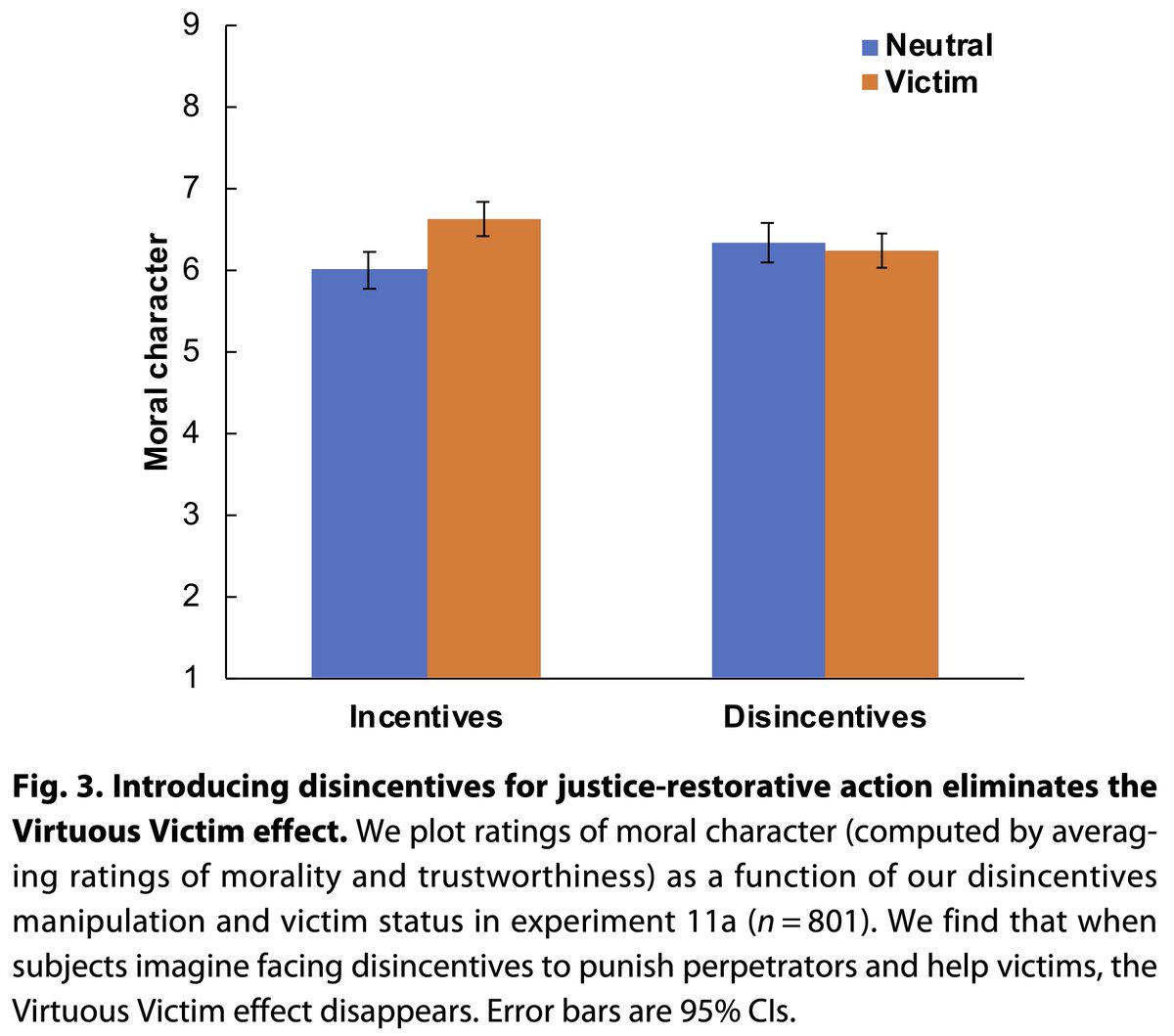
Our results thus suggest that people tend to see victims as good bc this motivates us to help & punish, and these justice-restorative actions are often aligned w/our social incentives
But when we face incentives to excuse rather than punish wrongdoing, the effect goes away
15/n
But when we face incentives to excuse rather than punish wrongdoing, the effect goes away
15/n
We also provide direct evidence against some alternative explanations for the Virtuous Victim effect.
16/n
16/n
Do victims just seem virtuous bc they stand in positive contrast to perpetrators?
If so, then after reading about wrongdoing, all non-perp parties should seem virtuous
Yet after reading about theft, subjects rated the *victim* as more moral than a non-victim third party.
17/n
If so, then after reading about wrongdoing, all non-perp parties should seem virtuous
Yet after reading about theft, subjects rated the *victim* as more moral than a non-victim third party.
17/n
Do people rate victims as moral simply bc they feel sorry for them & are motivated to positively evaluate those who have suffered?
If so, the effect should extend to victims of *accidental* misfortune, and apply equally to positive but *non-moral* traits
But it does not.
18/n
If so, the effect should extend to victims of *accidental* misfortune, and apply equally to positive but *non-moral* traits
But it does not.
18/n
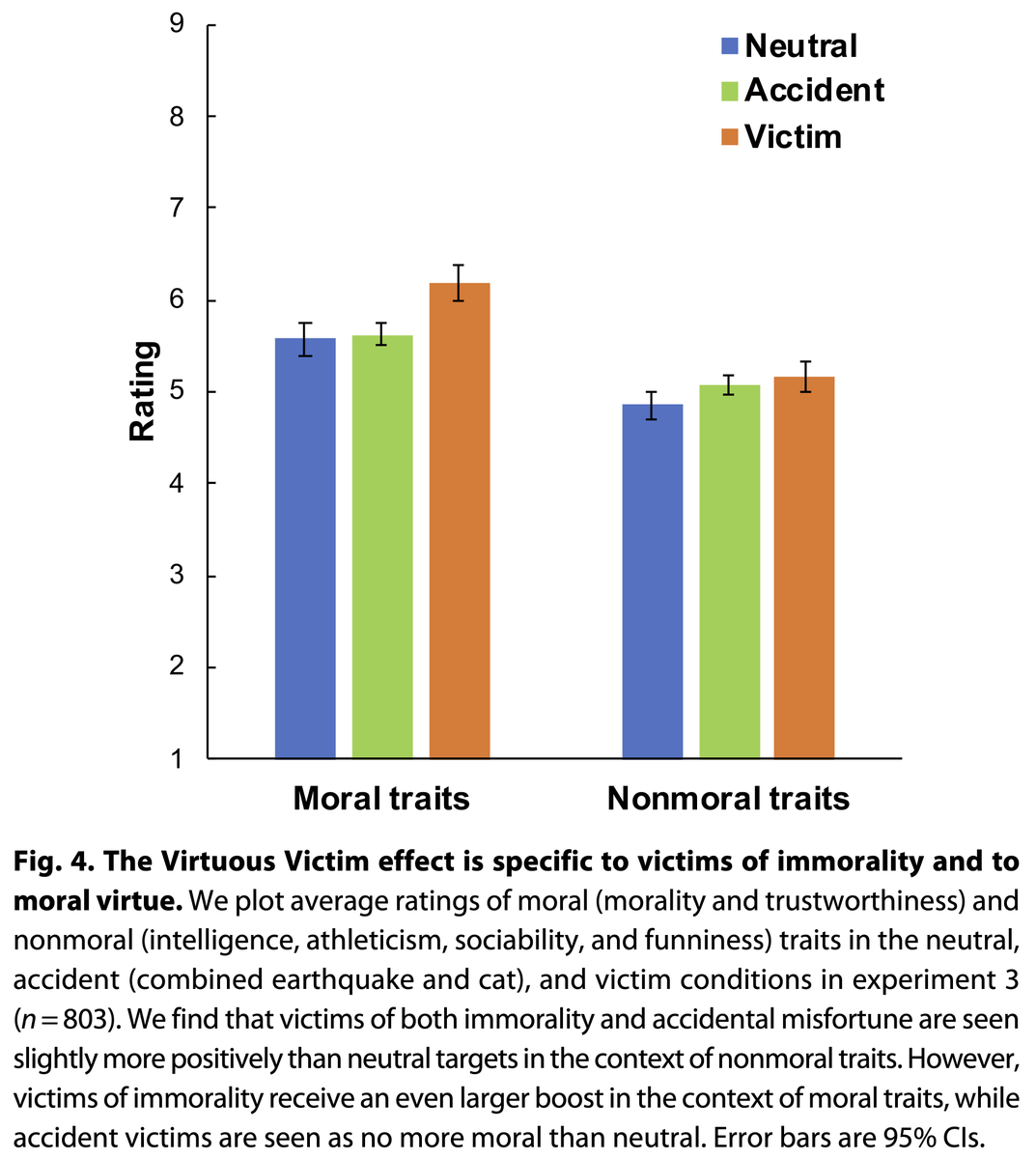
Do people genuinely believe that victims tend to be people who behave morally? (Perhaps bc trusting/giving ppl are more likely to be exploited?)
Again, the answer seems to be no: people rate victims as more virtuous *people*, but do not expect them to *behave* more morally
19/n
Again, the answer seems to be no: people rate victims as more virtuous *people*, but do not expect them to *behave* more morally
19/n
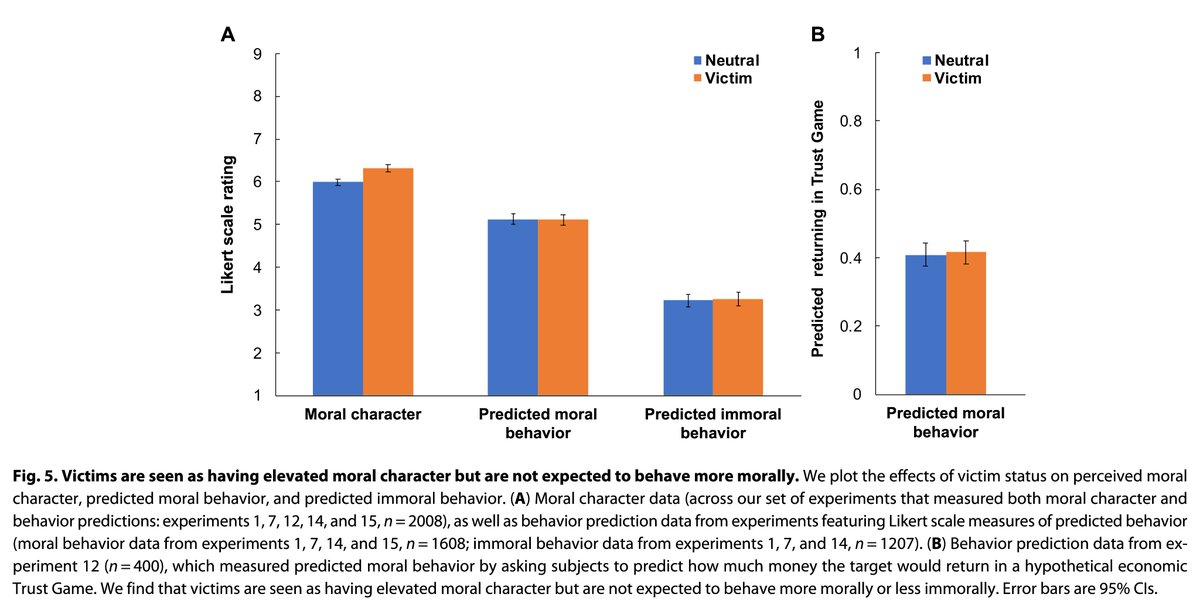
This interesting dissociation was unexpected. But it might make good sense, if…
-We see victims as good *people* bc this usefully motivates justice-restorative action
-But we don't expect victims to *behave* especially morally bc this would be a false & thus costly belief
20/n
-We see victims as good *people* bc this usefully motivates justice-restorative action
-But we don't expect victims to *behave* especially morally bc this would be a false & thus costly belief
20/n
So, TLDR version:
-People often see victims as morally good
-This seems to reflect that (i) seeing victims as virtuous motivates us to help victims & punish perpetrators and (ii) these actions are often (but not always!) aligned w/our social incentives
21/n
-People often see victims as morally good
-This seems to reflect that (i) seeing victims as virtuous motivates us to help victims & punish perpetrators and (ii) these actions are often (but not always!) aligned w/our social incentives
21/n
This framework may help explain why victims can be morally elevated, but are also sometimes blamed & shamed
When faced w strong incentives to excuse (rather than punish) wrongdoing, our theorizing predicts that ppl may actively *derogate* or smear the character of victims
22/n
When faced w strong incentives to excuse (rather than punish) wrongdoing, our theorizing predicts that ppl may actively *derogate* or smear the character of victims
22/n
Lots of important questions still remain open, as we discuss in our paper. Link again here!
And if you made it this far, thank you for reading!!
science.org/doi/10.1126/sc…
23/end
And if you made it this far, thank you for reading!!
science.org/doi/10.1126/sc…
23/end
• • •
Missing some Tweet in this thread? You can try to
force a refresh



